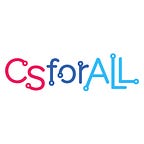The Importance to Recommit to Computer Science Efforts for the Students Who Need it the Most
As we approach the end of CS Commitment season, CSforALL interviews, member, Code.org on their 2020 CSforALL Commitment around expanding the way they collect data about who has computer science access.
With the 2021 CSforALL Commitment deadline being less than a month away, we remind the CSforALL community on how important it is that each of us take action in advancing computer science education. Last year, after our 2020 CSforALL Commitments Showcase, CSforALL had the opportunity to do a Q&A with Code.org about their 2020 CSforALL Commitment. Check-out our interview with them about their national commitment below!
CSforALL: Why was a 2020 Commitment extremely important to the national Computer Science community?
Code.org: The events 2020 — a global pandemic, economic recession, worldwide protests against racial inequities — have further shown us both the great promise and the perils of our technology. We rely on technology to keep us connected, but we’ve also seen how biased algorithms can divide us on the basis of race or gender. We rely on our technology to keep us informed, but we’ve also seen how easy it is to spread misinformation. We rely on our technology to stay productive, but we’ve left behind those who don’t have access to the internet.
We are witnessing first hand why equitable access to computer science is more important than ever, not only because it holds the key to solving global problems, but also because the solutions we develop must reflect the lives and experiences of everyone impacted by those problems — not just a select few.
It’s heartbreaking to think that the events of this year could wipe out so many of the gains in access and equity made by the K-12 CS movement. So, it is particularly important for the CS community to recommit to work harder for the students who need it the most.
CSforALL: How did your organization come up with your actionable and measurable CS commitment?
Code.org: Code.org began in 2013 with a mission to bring computer science to all students, particularly those who have been historically excluded from the field. Since then, we’ve worked continuously on many fronts to further that mission — developing equity-focused CS curriculum, advocating for policies that help get CS taught in schools, inspiring students to learn CS, and preparing educators to teach CS through our professional learning program. Teachers have been leaders of the grassroots movement in support of K-12 CS since the beginning, and the only way we will be able to provide all students the opportunity to learn CS is to prepare and empower more teachers to teach it.
CSforALL: Your 2020 CSforALL Commitment was around ‘Close the Gaps — Identify, Name, and Close CS Gaps’, what does this category mean to Code.org?
In order to close gaps in computer science, we must identify them. At Code.org, we’re tackling this by rethinking and expanding the way we collect data about who has access to and/or studies CS. We’ve committed to disaggregating student data by race and ethnicity. We’re also working to include broader data on student participation, such as students with disabilities, English-language learners, and economically disadvantaged students. This more detailed approach to data is reflected in a report published in October 2020 by Code.org in partnership with Computer Science Teachers Association and the Expanding Computing Education Pathways Alliance. As a result, the 2020 State of Computer Science Education:Illuminating Disparities offers one of the most complete views of computer science education in the U.S.
Committing to close the gaps in CS means also looking at intersectional data. As such, we’ve begun to dive deeper and recently shared a report with intersectional data on male and female students from four underrepresented racial and ethnic groups in computer science.
These changes in data collection allow us to paint a more detailed picture of who does — and does not — have access to computer science and better direct our equity and inclusion efforts.
CSforALL: What did you learn with the 2020 events around the pandemic and racial equity? What action plan does your organization have?
The egregious acts of racial injustice last year spurred Code.org to examine how we could better support our Black employees, students and teachers. Code.org laid out the steps we plan to take, including creating a more supportive workplace for Black employees, using our microphone and social media following to amplify Black voices, and using our curriculum, professional learning programs, policy/advocacy programs to better support Black students.
We’ve also adopted more inclusive language in how we refer to racial and ethnic groups.
We also recognize that the pandemic could further exacerbate the digital divide, and widen the gaps between students who have adequate internet access and those who do not. To that end, we are rethinking how we can support CS teachers who are dealing with a range of teaching environments, from fully remote instruction, to a hybrid model, to in-person instruction. We’ve created modifications to support distance learning and alternative classroom models for all three of our courses, and we’re placing an emphasis on how to participate in an Hour of Code during CSEdWeek virtually.
Make a 2021 CSforALL Summit by September 10, 2021: https://www.summit.csforall.org/
About the Author: Code.org® is a nonprofit dedicated to expanding access to computer science in schools and increasing participation by young women and students from other underrepresented groups. Our vision is that every student in every school has the opportunity to learn computer science as part of their core K-12 education. The leading provider of K-12 computer science curriculum in the largest school districts in the United States, Code.org also created the annual Hour of Code campaign, which has engaged more than 15% of all students in the world. Code.org is supported by generous donors including Microsoft, Facebook, Amazon, the Infosys Foundation, Google and many more.
